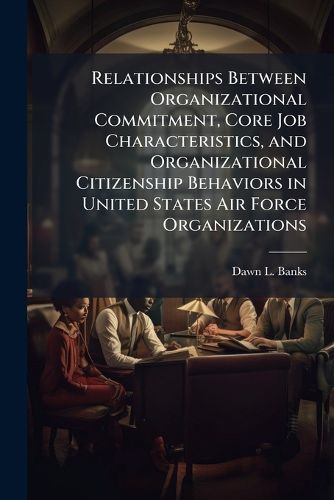Readings Newsletter
Become a Readings Member to make your shopping experience even easier.
Sign in or sign up for free!
You’re not far away from qualifying for FREE standard shipping within Australia
You’ve qualified for FREE standard shipping within Australia
The cart is loading…






Organizational commitment is an area of concern for Air Force leaders, so much so that commitment is a subject of interest on the annual Air Force Climate Assessment Survey. The Air Force has consistently failed to meet retention goals and designates millions of dollars toward reenlistment bonuses to improve retention every year. A more economical approach to increasing commitment may be to improve the characteristics of the job Air Force members perform. In addition to the relationship between commitment and job characteristics, there is also a relationship between commitment and organizational citizenship behaviors (OCBs). The purpose of this research is to examine the relationship between core job characteristics, organizational commitment, and the presence of OCBs in an Air Force setting. This research found that there was a positive correlation between organizational commitment and core job characteristics, and that there was a positive correlation between organizational commitment and OCBs. Commitment, however, was not found to mediate the relationship between core job characteristics and OCBs.
This work has been selected by scholars as being culturally important, and is part of the knowledge base of civilization as we know it. This work was reproduced from the original artifact, and remains as true to the original work as possible. Therefore, you will see the original copyright references, library stamps (as most of these works have been housed in our most important libraries around the world), and other notations in the work.
This work is in the public domain in the United States of America, and possibly other nations. Within the United States, you may freely copy and distribute this work, as no entity (individual or corporate) has a copyright on the body of the work.
As a reproduction of a historical artifact, this work may contain missing or blurred pages, poor pictures, errant marks, etc. Scholars believe, and we concur, that this work is important enough to be preserved, reproduced, and made generally available to the public. We appreciate your support of the preservation process, and thank you for being an important part of keeping this knowledge alive and relevant.
$9.00 standard shipping within Australia
FREE standard shipping within Australia for orders over $100.00
Express & International shipping calculated at checkout
Organizational commitment is an area of concern for Air Force leaders, so much so that commitment is a subject of interest on the annual Air Force Climate Assessment Survey. The Air Force has consistently failed to meet retention goals and designates millions of dollars toward reenlistment bonuses to improve retention every year. A more economical approach to increasing commitment may be to improve the characteristics of the job Air Force members perform. In addition to the relationship between commitment and job characteristics, there is also a relationship between commitment and organizational citizenship behaviors (OCBs). The purpose of this research is to examine the relationship between core job characteristics, organizational commitment, and the presence of OCBs in an Air Force setting. This research found that there was a positive correlation between organizational commitment and core job characteristics, and that there was a positive correlation between organizational commitment and OCBs. Commitment, however, was not found to mediate the relationship between core job characteristics and OCBs.
This work has been selected by scholars as being culturally important, and is part of the knowledge base of civilization as we know it. This work was reproduced from the original artifact, and remains as true to the original work as possible. Therefore, you will see the original copyright references, library stamps (as most of these works have been housed in our most important libraries around the world), and other notations in the work.
This work is in the public domain in the United States of America, and possibly other nations. Within the United States, you may freely copy and distribute this work, as no entity (individual or corporate) has a copyright on the body of the work.
As a reproduction of a historical artifact, this work may contain missing or blurred pages, poor pictures, errant marks, etc. Scholars believe, and we concur, that this work is important enough to be preserved, reproduced, and made generally available to the public. We appreciate your support of the preservation process, and thank you for being an important part of keeping this knowledge alive and relevant.